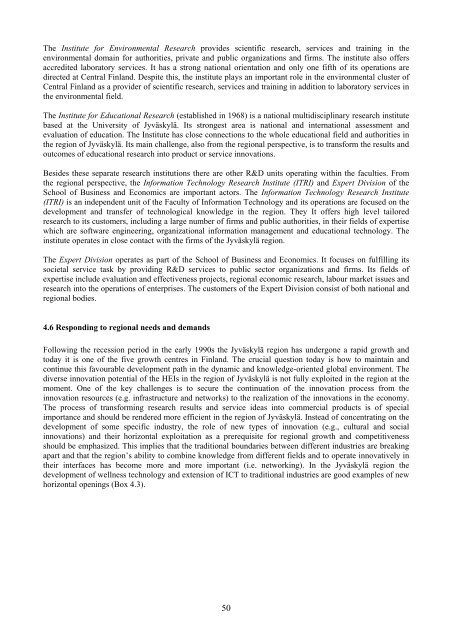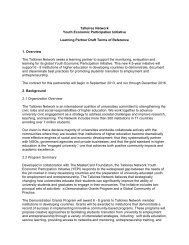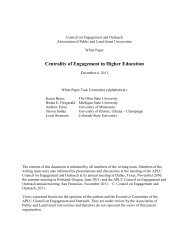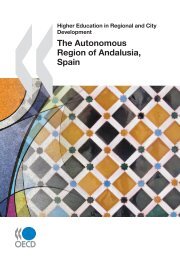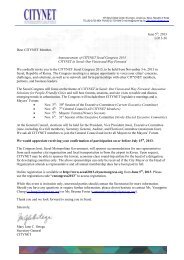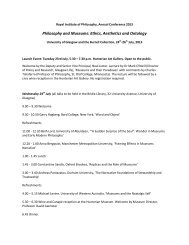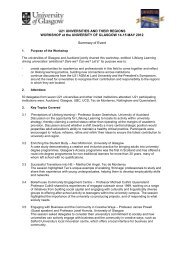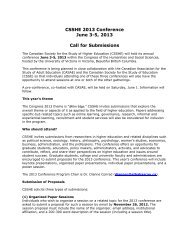Box 4.2 Nanotechnology – new field of expertiseThe latest strategic field of expertise in the Jyväskylä region is Nanotechnology. The strong knowledgebase in nanotechnology is being developed in the Faculty of Mathematics and Science of the Universityof Jyväskylä. The Nanoscience project launched in year 2001 aims at bringing together scientists fromvarious disciplines i.e. physics, chemistry and biochemistry, sharing a common interest in the phenomenaof nanoscale dimension. Year 2002 was an important milestone of the process. The first faculty positionin <strong>Finland</strong>, fully devoted to nanoscience, was filled and planning of the new Nanoscience buildingstarted. Moreover, the first call for the International Master’s Program in NanoScience was announcedand several multidisciplinary research projects were initiated. The Nanoscience Center - aninterdisciplinary research and business environment - was established in Oct 2004. Then elevenprofessors and their research groups altogether nearly 100 persons moved into the new premisesfurnished with state of art nanotechnology research equipment.Nanotechnology is one of the focuses of the regional Centre of Expertise Programme of the Jyväskyläregion. The main regional authorities and development organizations are committed to the developmentwork. Nanotechnology opens up opportunities also for cooperation between the University of Jyväskyläand the Jyväskylä Polytechnic, particularly in the later phases of the process. The development ofnanotechnology also supports the goals for a knowledge society and know-how -oriented businessemphasized in the Lisbon strategy. Developing the knowledge base is a long process and the realizationof its commercial effects takes years (at present three firms providing nanosolutions are operating in theregion of Jyväskylä). The special value of nanotechnology is that it can be utilized in many fieldsallowing creation of horizontal innovations. The field of nanotechnology is expected to grown into asource of an impulse for world wide development, and Jyväskylä plans to be in the front line ofexpertise. The aim is for the Nanoscience Center to become a top-flight international unit and assume asignificant role in business activity exploiting nanotechnology. The coming years will show how thesehuge expectations will be met.The knowledge base of both HEIs in these different fields offer a breeding place for technical as well associal innovations. The R&D activities of the University of Jyväskylä and Jyväskylä Polytechnic are carriedout by launching projects which form a part of a larger field of development (e.g., renewable energy,wellness technology or nanotechnology), or they focus on some narrow single field of competence (e.g., theWIRE–project aiming at social inclusion or the environmental project of restoring Lake Jyväsjärvi) or on theneeds of firms or organizations (customized R&D services).4.5 Main research units of the University of JyväskyläThe University of Jyväskylä governs several separate research units which operate in cooperation with itsfaculties. One of these is the Agora Center, founded in 2002 as an independent and interdisciplinary researchconsortium at the University of Jyväskylä. It organizes research at which social and human sciences,including psychology, education, humanities, sport and health sciences, and economics, intersect withinformation technology. The Centre’s research approach is based on a holistic view of the future knowledgesociety where humans and technology interact, with an emphasis on information and communicationtechnologies. The City of Jyväskylä and local businesses have been active partners in developing Agora.Agora creates a bridge for research applications by providing office space for private enterprises working inthe sector of information technology. This cooperation extends beyond the building itself to joint activities inthe whole region, and includes the public and third sectors. The Agora Center carries out EU projects, centreof expertise projects and Tekes projects in the region. Its role in the region is to produce high level researchand act as a pioneer in human tech and mental management. The Agora Center and its brand are well knownoutside the region as well, and several research laboratories are operating in the Agora. From the regionalpoint of view the most important ones are the Game Laboratory and Innoroad Laboratory. The formercoordinates and enhances game research, development, and training activities at the University of Jyväskylä.The laboratory also serves as a network for other actors in the field, and thus forms a link between theUniversity, other game research networks, and private enterprises. The Innoroad Laboratory aims atconstructing a basis for the multidisciplinary academic education and research in the field of transportation.49
The Institute for Environmental Research provides scientific research, services and training in theenvironmental domain for authorities, private and public organizations and firms. The institute also offersaccredited laboratory services. It has a strong national orientation and only one fifth of its operations aredirected at Central <strong>Finland</strong>. Despite this, the institute plays an important role in the environmental cluster ofCentral <strong>Finland</strong> as a provider of scientific research, services and training in addition to laboratory services inthe environmental field.The Institute for Educational Research (established in 1968) is a national multidisciplinary research institutebased at the University of Jyväskylä. Its strongest area is national and international assessment andevaluation of education. The Institute has close connections to the whole educational field and authorities inthe region of Jyväskylä. Its main challenge, also from the regional perspective, is to transform the results andoutcomes of educational research into product or service innovations.Besides these separate research institutions there are other R&D units operating within the faculties. Fromthe regional perspective, the Information Technology Research Institute (ITRI) and Expert Division of theSchool of Business and Economics are important actors. The Information Technology Research Institute(ITRI) is an independent unit of the Faculty of Information Technology and its operations are focused on thedevelopment and transfer of technological knowledge in the region. They It offers high level tailoredresearch to its customers, including a large number of firms and public authorities, in their fields of expertisewhich are software engineering, organizational information management and educational technology. Theinstitute operates in close contact with the firms of the Jyväskylä region.The Expert Division operates as part of the School of Business and Economics. It focuses on fulfilling itssocietal service task by providing R&D services to public sector organizations and firms. Its fields ofexpertise include evaluation and effectiveness projects, regional economic research, labour market issues andresearch into the operations of enterprises. The customers of the Expert Division consist of both national andregional bodies.4.6 Responding to regional needs and demandsFollowing the recession period in the early 1990s the Jyväskylä region has undergone a rapid growth andtoday it is one of the five growth centres in <strong>Finland</strong>. The crucial question today is how to maintain andcontinue this favourable development path in the dynamic and knowledge-oriented global environment. Thediverse innovation potential of the HEIs in the region of Jyväskylä is not fully exploited in the region at themoment. One of the key challenges is to secure the continuation of the innovation process from theinnovation resources (e.g. infrastructure and networks) to the realization of the innovations in the economy.The process of transforming research results and service ideas into commercial products is of specialimportance and should be rendered more efficient in the region of Jyväskylä. Instead of concentrating on thedevelopment of some specific industry, the role of new types of innovation (e.g., cultural and socialinnovations) and their horizontal exploitation as a prerequisite for regional growth and competitivenessshould be emphasized. This implies that the traditional boundaries between different industries are breakingapart and that the region’s ability to combine knowledge from different fields and to operate innovatively intheir interfaces has become more and more important (i.e. networking). In the Jyväskylä region thedevelopment of wellness technology and extension of ICT to traditional industries are good examples of newhorizontal openings (Box 4.3).50
- Page 1 and 2: OECD/IMHE ‐ Supporting thecontrib
- Page 3 and 4: SUMMARYTogether with 13 other regio
- Page 5 and 6: 8.2 Increasing the regional effecti
- Page 7 and 8: I INTRODUCTION1.1 Strengthening the
- Page 9 and 10: development. The aim is that region
- Page 11 and 12: The self-evaluation considered here
- Page 13 and 14: densely populated cities in Finland
- Page 15 and 16: 1,9 %1,7 %1,5 %1,3 %Population chan
- Page 17 and 18: The share of jobs in primary produc
- Page 19 and 20: New pillars of future’s developme
- Page 21 and 22: Jyväskylä0,60,91,11,0Central Finl
- Page 23 and 24: 2.4 Governance StructureMunicipalit
- Page 25 and 26: of its development outside the cent
- Page 27 and 28: III CHARACTERISTICS OF THE HIGHER E
- Page 29 and 30: continuing education and open unive
- Page 31 and 32: The Science and Technology Policy C
- Page 33 and 34: 3.2 Regional dimension within the n
- Page 35 and 36: order to respond to the challenges
- Page 37 and 38: 14001200Master's degreesDoctoratesN
- Page 39 and 40: 900800Youth graduatedAdult graduate
- Page 41 and 42: provide information for the basis o
- Page 43 and 44: CabinetParliamentSTPCSteering (andf
- Page 45 and 46: 5,04,0Billion euros3,02,01,00,083 8
- Page 47 and 48: The number of refereed articles is
- Page 49: Centre of expertisePaper industryBi
- Page 53 and 54: and systematic gradually progressin
- Page 55 and 56: are seen to be very important chann
- Page 57 and 58: Internal support units of HEIsThe F
- Page 59 and 60: of interviewed HEI staffs, the coop
- Page 61 and 62: areas of the region’s Centre of E
- Page 63 and 64: system of Jyväskylä and the HEIs
- Page 65 and 66: V CONTRIBUTION OF TEACHING AND LEAR
- Page 67 and 68: esources to establish new activitie
- Page 69 and 70: The main problem for the Finnish la
- Page 71 and 72: longer. 2.5% of the Jyväskylä Pol
- Page 73 and 74: activities. As a part of the new qu
- Page 75 and 76: education programmes consisting of
- Page 77 and 78: the TE-Centre of Central Finland an
- Page 79 and 80: practices in the provision of educa
- Page 81 and 82: Reason forskillupgradingDescription
- Page 83 and 84: Strengths+ HEIs are actively confro
- Page 85 and 86: taxation, to lower the unemployment
- Page 87 and 88: Box 6.2 The WIRE -projects: Support
- Page 89 and 90: indoor ice-skating rink, the Rauhal
- Page 91 and 92: The School of Cultural Studies at t
- Page 93 and 94: the number of registered customers
- Page 95 and 96: Box 6.9 Environmental management in
- Page 97 and 98: Strengths+ The significance of HEIs
- Page 99 and 100: eferring to the regional developmen
- Page 101 and 102:
Key topics relating to changes in t
- Page 103 and 104:
participation in the decision makin
- Page 105 and 106:
in the strategy-making process. The
- Page 107 and 108:
7.5 Critical points in promoting th
- Page 109 and 110:
7.Cooperation in strategies concern
- Page 111 and 112:
egion is according to national and
- Page 113 and 114:
oundaries for further developmental
- Page 115 and 116:
joining resources and operations by
- Page 117 and 118:
Discussion proposal 15: To ensure d
- Page 119 and 120:
achieved by the horizontal utilizat
- Page 121 and 122:
Appendix 2 Information on data used
- Page 123 and 124:
and finding synergy between the oth
- Page 125 and 126:
School of BusinessRoleThe School of
- Page 127 and 128:
The challenge of the school from re
- Page 129 and 130:
developing wellness and environment
- Page 131 and 132:
Faculty of EducationRoleThe Faculty
- Page 133 and 134:
and/or graduation thesis is a signi
- Page 135 and 136:
Areas of strength and prioritising
- Page 137 and 138:
Agora Center’s partners from the
- Page 139 and 140:
Currently the priority of ITRI’s
- Page 141 and 142:
Weak spots and areas to develop in
- Page 143 and 144:
Employment and Economic Development
- Page 145 and 146:
Appendix 3 Analysis of the most sig
- Page 147 and 148:
Appendix 4 Regional effects (input-
- Page 149 and 150:
The overall value of production cre
- Page 151 and 152:
Appendix 5 Reform of regional struc
- Page 153 and 154:
Appendix 7 Provision of education i
- Page 155 and 156:
Appendix 8 Statistical information
- Page 157 and 158:
Appendix 10 Statistics on financing
- Page 159 and 160:
Appendix 12 Labour market activity
- Page 161 and 162:
Appendix 14 Master’s Programmes a
- Page 163 and 164:
Uusiutuvan energian tutkimusohjelma
- Page 165 and 166:
BIBLIOGRAPHYAcademy of Finland (200


